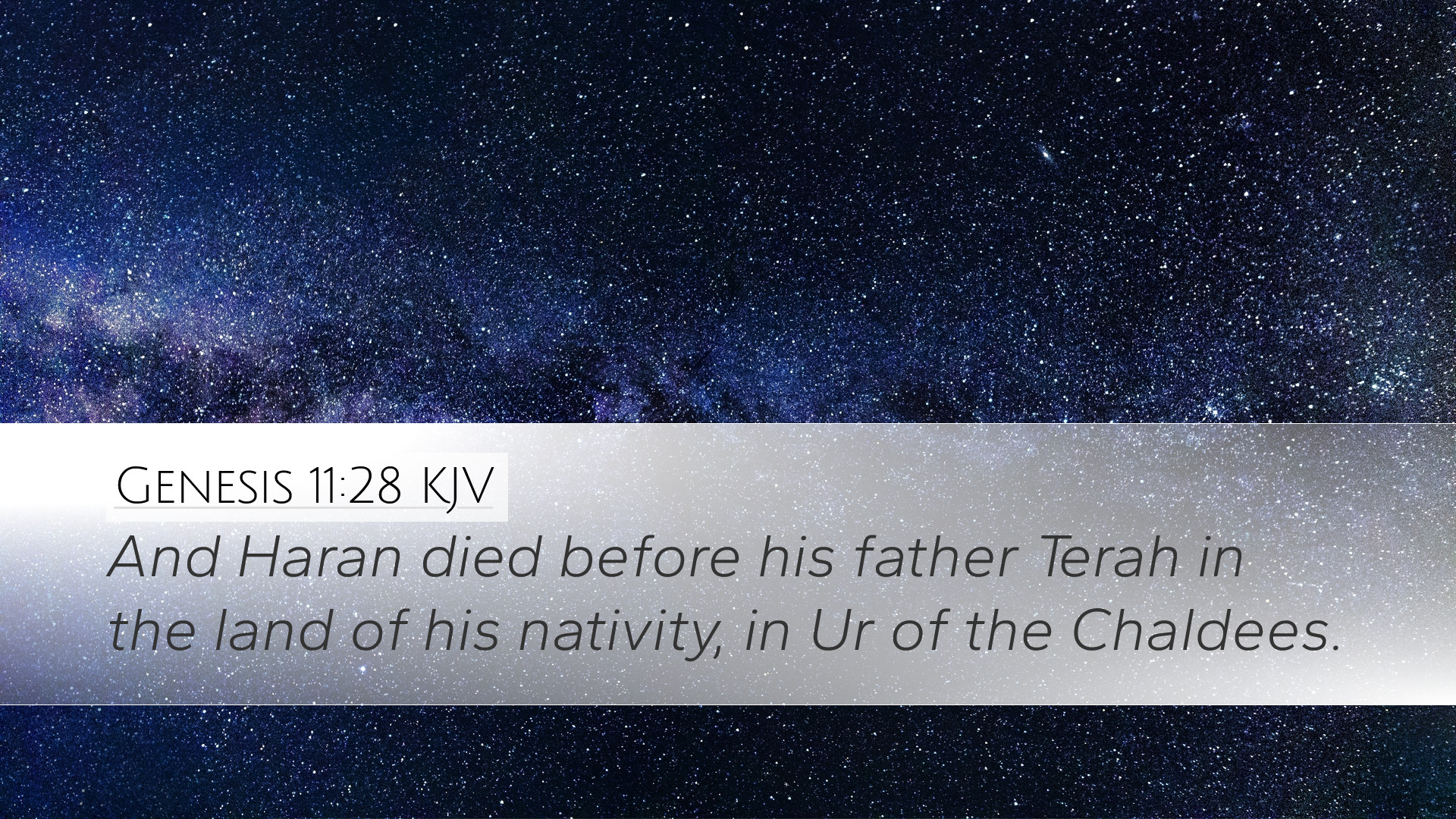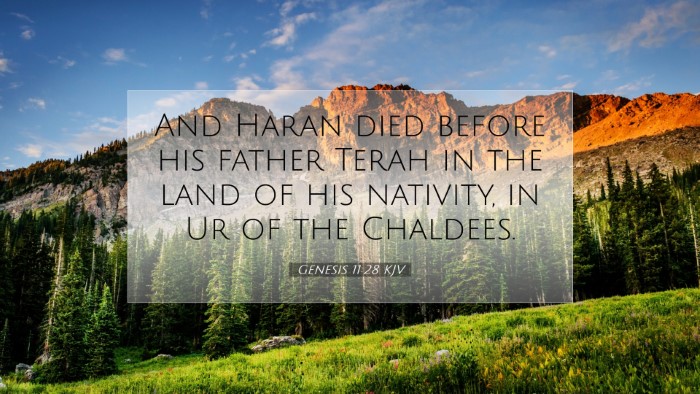Commentary on Genesis 11:28
Genesis 11:28 states: "And Haran died before his father Terah in the land of his nativity, in Ur of the Chaldees."
This passage introduces the tragic narrative of Haran's death, a significant moment in the lineage of Abraham, which invites deeper theological reflection.
Introduction to the Context
To understand the implications of this verse, we revisit the surrounding context. Genesis chapters 11 serves as a bridge connecting the earlier primeval history with the patriarchal narratives that follow.
The genealogical records detail the descent from Shem leading to Terah’s family, highlighting the importance of Terah as the father of Abram (later Abraham).
Insights from Common Commentaries
Matthew Henry's Commentary
Matthew Henry emphasizes the familial ties that shape the biblical narrative. He draws attention to Haran's premature death, noting that it occurred "before his father Terah," which implies a significant emotional gravitas.
Henry suggests that this event creates a poignant context for understanding Abram's later calling and his journey from Ur. Haran's death is seen as a disruption in Terah's legacy and a catalyst for Abram's departure.
Albert Barnes' Notes on the Bible
Albert Barnes provides a more historical analysis, elucidating that Ur of the Chaldees was known for its idolatry. Haran's demise in this setting signals a deeper moral and spiritual narrative about the environment in which Abram was raised.
Barnes notes the implication of Haran's death occurring in close proximity to Terah, which may reflect on familial and communal loss. He mentions the potential spiritual significance, as Abram's eventual call to leave Ur becomes an act of faith amid loss and idolatry.
Adam Clarke's Commentary
Adam Clarke offers an in-depth exploration of the names and word meanings in this passage. He underscores that the death of Haran before Terah in Ur may suggest not only a physical demise but also a spiritual one.
Clarke expounds upon the idea that while Haran may not have inherited the same covenantal promise that was later bestowed upon Abram, his existence and subsequent death primes the narrative for God's redemptive plan through Abraham.
Theological Implications
The death of Haran plays a critical role in understanding God's plan of redemption. This verse encourages reflection on themes of loss, calling, and the divine orchestration of events leading to the establishment of a covenant nation.
For pastors and theologians, it provides an opportunity to discuss how personal loss can often precede significant spiritual movements or transformations in one’s life.
Impact on Abram's Calling
Haran's death ultimately serves as a backcloth for Abram's call to leave everything familiar behind. The environment of Ur, saturated with pagan practices, juxtaposes starkly against Abram's journey toward fulfilling God's promise.
This command to depart holds nuanced significance, rooted in the personal grief and familial backdrop that could have yielded conflicting emotions for Abram.
Familial Relationships and God's Sovereignty
The relationship between Terah, Abram, and Haran indicates a complex interplay of family dynamics and divine sovereignty.
The loss of a family member can serve as a pivotal factor in the decisions that shape future generations. This tragedy becomes a thread in the tapestry of God’s providential plans for His people.
Practical Applications
For students and pastors alike, Genesis 11:28 illustrates key lessons in navigating grief and understanding God's direction through tragedy.
- The Significance of Grief: Understand the role of grief in spiritual formation and community life.
- Faith and Obedience: Reflect on the obedience that arises from personal loss; consider what God may be calling you to leave behind.
- The Power of Context: Recognize how our origins, familial backgrounds, and losses can influence our spiritual journeys.
Conclusion
In conclusion, Genesis 11:28 is not merely a genealogical detail but a profound moment laden with emotional and spiritual weight. The insights gleaned from Matthew Henry, Albert Barnes, and Adam Clarke deepen our understanding of familial obligations, divine callings, and the unfolding of God's redemptive narrative despite human loss.
It invites ongoing reflection on how in the midst of personal and communal grief, God remains sovereign and active, leading His people towards His purposes.


